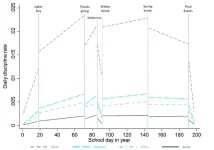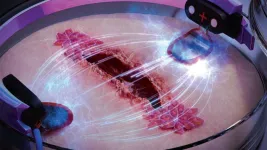(Press-News.org) A randomised clinical trial is looking at whether faecal microbiota transplantation (FMT) from healthy donors into adults with early-stage amyotrophic lateral sclerosis (ALS – one of the most common forms of motor neurone disease) can modulate the immune reaction during inflammation responses that characterise disease progression, and aims to investigate the relationship between specific gut bacteria and their action on immune system cells.
The preliminary findings by Dr Alessandra Guarnaccia from Columbus-Gemelli University Hospital IRCCS, Rome, Italy and colleagues are being presented at this year’s European Congress of Clinical Microbiology & Infectious Diseases (ECCMID) in Copenhagen, Denmark (15-18 April).
ALS is a devastating condition in which the motor neurons in the spinal cord and brain degenerate, causing progressive paralysis, increasing physical disability and ultimately death within an average of two to five years.
ALS is the most common form of motor neuron disease, with an average incidence of 2.8 per 100,000 people in Europe and 1.8 per 100,000 people in North America.
Around 5-10% of people with ALS have a variety of genetic causes that can be inherited within families, but 90% have what is known as “sporadic” disease because its causes are unknown. This makes it a difficult challenge to find one treatment that will work for all patients with ALS.
Recent findings suggest that oxidative stress (an imbalance between free radical chemicals and antioxidants in the body), nerve cell damage or death (exotoxicity), and the activation of pro-inflammatory pathways as key trigger factors for the disease.
Given the role of regulatory T cells (Tregs) in regulating or suppressing the immune system, it is thought that increasing or activating their populations in patients with ALS may have therapeutic benefits.
It has been known for some time that changes in gut microbiota composition may be linked to many neurological disorders through the “gut-brain axis”. In fact, specific gut microbiota populations (Proteobacteria) cross talk with the immune system promoting the activation of pro-inflammatory pathways following the loss of Treg number and suppressive function.
In addition, previous mouse models have shown a significant impairment in the gut microbial population in early-stage ALS, pointing to a possible role of the gut microbiota in the development of ALS.
FMT is already used in clinical practice to restore gut microbiota balance and to modulate gut and systemic immunity in recurrent Clostridioides difficile infection disease.
The trial randomly allocated 42 ALS patients (aged 18 to 70 years) who had symptoms for no longer than 18 months to either FMT (28 patients) or placebo (14 controls). At the start of the study and 6 months later, researchers will infuse the gut microbes from healthy donors into patients in the intervention group, while those in the control group will not receive any infusion.
On the day of each procedure, researchers will collect stool, saliva, and blood samples to evaluate how the transplant affected gut microbiota, immune cells and inflammatory status, which may shed light on early processes possibly leading to the degenerative ALS course.
Each patient will also undergo three endoscopic procedures to take intestinal biopsies (at the start of the study and months 6 and 12).
The primary outcome is a significant change in Treg number between FMT-treated patients and the control arm from the start of the study to month 6.
FMT has been shown to be a safe procedure in these patients, with no adverse events reported to date.
Preliminary results outlining the gut microbiome profile of six patients at the start of the study revealed a much higher relative abundance (on average 15%) of Proteobacteria - a large group of microbes which have surface proteins that can easily activate the immune system. This activation alerts the body to an illness and triggers the release of molecules causing inflammation.
“The unmet need for therapies for ALS is huge, and our work opens up a whole new pathology that we could address,” says Dr Guarnaccia. “The hope is that FMT will increase the Treg number switching the immune system surrounding motor neurons to an anti-inflammatory, neuroprotective status, and slowing the progression of ALS.”
Author Professor Luca Masucci from the Catholic University of the Sacred Heart in Rome, Italy, adds, “With this information, we could potentially provide new approaches for treatments by altering or interfering with these inflammatory pathways. We hope to have all our data from this trial to analyse in 2024.”
ALS can affect anyone regardless of racial, ethnic, or socioeconomic background. In general, symptoms commonly develop between the ages of 40 and 70, with the average being 55 years at diagnosis.
A number of high-profile British sportsmen have shared their experience with motor neuron disease in recent years, including rugby league's Rob Burrow, rugby union's Doddie Weir and footballer Stephen Darby.
Professor Stephen Hawking also had the disease, but lived for 55 years after his diagnosis until his death in 2018 at the age of 76 years.
For interviews with the report authors, please email Dr Alessandra Guarnaccia, Columbus-Gemelli University Hospital IRCCS, Rome, Italy at aguarnaccia.bio@gmail.com
Alternative contact in the ECCMID Press Room: Tony Kirby T) + 44(0)7834 385827 E) tony@tonykirby.com Notes to editors:
The authors declare no conflicts of interest.
This press release is based on abstract 5037 at the European Congress of Clinical Microbiology & Infectious Diseases (ECCMID) annual meeting. The material has been peer reviewed by the congress selection committee. There is no full paper available at this stage and the work has not yet been submitted to a medical journal for publication.
END
Early study - faecal transplant to help slow early-stage motor neuron disease progression
Randomised trial in early-stage motor neuron disease assesses faecal microbiota transplantation as a potential tool to alter gut microbiota and, then, to intervene in the inflammation status that is considered a potential trigger for disease progression
2023-04-18
ELSE PRESS RELEASES FROM THIS DATE:
Preventing a measles outbreak: steps taken by London hospital to protect patients and staff potentially exposed to the virus
2023-04-18
The steps taken by a London hospital to prevent an outbreak of measles will be detailed at this year’s European Congress of Clinical Microbiology & Infectious Diseases (ECCMID) in Copenhagen, Denmark (15-18 April).
Measles, which is highly contagious, can cause serious and potentially life-threating illness and complications including blindness, encephalitis (swelling of the brain) and pneumonia. Pregnant women, infants and severely immunocompromised individuals are at highest risk.
Contracted when pregnant, it can cause low birth weight babies, premature birth, miscarriage or stillbirth.
It usually starts with cold-like symptoms, followed by a rash a few days later. ...
AI software at least as good as radiologists at detecting TB from chest X-rays
2023-04-18
AI software can accurately detect TB from chest X-rays, a study being presented at this year’s European Congress of Clinical Microbiology & Infectious Diseases (ECCMID) in Copenhagen, Denmark, (15-18 April), shows.
Tuberculosis (TB) is a major cause of death and disease worldwide. It causes 1.6 million deaths a year, making it is the 13th leading cause of death globally and the second biggest infectious killer, after COVID-19.
In low-resource settings, chest X-rays play an important role in the diagnosis of patients ...
Targeting nurse and patient ‘supercontactors’ in hospitals and long-term care facilities can help minimize spread of infectious diseases
2023-04-18
New research presented at this week’s European Congress of Clinical Microbiology & Infectious Diseases (Copenhagen, 15-18 April) shows how interventions focused on so called ‘supercontactors’ in hospitals and other long term care facilities (LTCF) can optimise infection control and reduce the spread of infectious diseases. The study is by Dr Quentin Leclerc and colleagues at Institut Pasteur and the Conservatoire National des Arts et Métiers (Paris, France).
Hospitals and ...
Using machine learning to find reliable and low-cost solar cells
2023-04-18
Researchers at the University of California, Davis College of Engineering are using machine learning to identify new materials for high-efficiency solar cells. Using high-throughput experiments and machine learning-based algorithms, they have found it is possible to forecast the materials’ dynamic behavior with very high accuracy, without the need to perform as many experiments.
The work is featured on the cover of the April issue of ACS Energy Letters.
Hybrid perovskites are organic-inorganic molecules that have received a lot of attention ...
Resident T-cells key to salmonella immunity
2023-04-18
Salmonella infections cause about a million deaths a year worldwide, and there is an urgent need for better vaccines for both typhoid fever and non-typhoidal Salmonella disease. New work from researchers at the UC Davis School of Veterinary Medicine shows how memory T cells, crucial for a vaccine that induces a powerful immune response, can be recruited into the liver in a mouse model of Salmonella.
The work was published April 11 in Proceedings of the National Academy of Sciences.
“Understanding the immunology is key to developing a better vaccine,” said Professor Stephen McSorley, ...
Counting the cost of sunshine: Finding a better metric to measure human ecological footprints
2023-04-18
This planet of 8 billion people is bumping up against its ecological limits, and researchers are trying to quantify the effect of human activity on these finite resources. Some keep tallies of how much carbon they contribute to the atmosphere, others measure direct and indirect water consumption or keep tabs on the amount of land that our food habits demand.
Each of these “footprints” offers an estimate of the impacts individuals and institutions have on the wider world, and are useful — but are flawed, according to geographer Chris ...
School discipline can be predicted, new research says. Is it preventable?
2023-04-18
Berkeley — Rates of school discipline fluctuate widely and predictably throughout a school year and increase significantly faster for Black students than for their white counterparts, University of California, Berkeley, researchers have found.
A new study published today in the journal Proceedings of the National Academy of Sciences documents for the first time the “dynamic” nature of student discipline during an academic year. Daily rates of punishment across all schools in the study ratchet up in the weeks before Thanksgiving break, decline immediately ...
How electricity can heal wounds three times as fast
2023-04-18
Chronic wounds are a major health problem for diabetic patients and the elderly – in extreme cases they can even lead to amputation. Using electric stimulation, researchers in a project at Chalmers University of Technology, Sweden, and the University of Freiburg, Germany, have developed a method that speeds up the healing process, making wounds heal three times faster.
There is an old Swedish saying that one should never neglect a small wound or a friend in need. For most people, a small wound does not lead to any serious complications, but many common diagnoses ...
Orb weaver spider glue properties evolve faster than their glue genes, scientists find
2023-04-18
Spiders that don’t weave good silk don’t get to eat. The silk spiders produce which creates their webs is key to their survival – but spiders live in many different places which require webs fine-tuned for local success. Scientists studied the glue that makes orb weaver spiders’ webs sticky to understand how its material properties vary in different conditions.
“Discovering the sticky protein components of biological glues opens the doors to determining how material properties evolve,” said Dr Nadia Ayoub of Washington and Lee University, co-corresponding author of the study ...
Machine learning can help to flag risky messages on Instagram while preserving users’ privacy
2023-04-17
As regulators and providers grapple with the dual challenges of protecting younger social media users from harassment and bullying, while also taking steps to safeguard their privacy, a team of researchers from four leading universities has proposed a way to use machine learning technology to flag risky conversations on Instagram without having to eavesdrop on them. The discovery could open opportunities for platforms and parents to protect vulnerable, younger users, while preserving their privacy.
The team, led by researchers from Drexel University, Boston University, Georgia Institute of Technology ...
LAST 30 PRESS RELEASES:
CU Anschutz School of Medicine receives best ranking in NIH funding in 20 years
Mayo Clinic opens patient information office in Cayman Islands
Phonon lasers unlock ultrabroadband acoustic frequency combs
Babies with an increased likelihood of autism may struggle to settle into deep, restorative sleep, according to a new study from the University of East Anglia.
National Reactor Innovation Center opens Molten Salt Thermophysical Examination Capability at INL
International Progressive MS Alliance awards €6.9 million to three studies researching therapies to address common symptoms of progressive MS
Can your soil’s color predict its health?
Biochar nanomaterials could transform medicine, energy, and climate solutions
Turning waste into power: scientists convert discarded phone batteries and industrial lignin into high-performance sodium battery materials
PhD student maps mysterious upper atmosphere of Uranus for the first time
Idaho National Laboratory to accelerate nuclear energy deployment with NVIDIA AI through the Genesis Mission
Blood test could help guide treatment decisions in germ cell tumors
New ‘scimitar-crested’ Spinosaurus species discovered in the central Sahara
“Cyborg” pancreatic organoids can monitor the maturation of islet cells
Technique to extract concepts from AI models can help steer and monitor model outputs
Study clarifies the cancer genome in domestic cats
Crested Spinosaurus fossil was aquatic, but lived 1,000 kilometers from the Tethys Sea
MULTI-evolve: Rapid evolution of complex multi-mutant proteins
A new method to steer AI output uncovers vulnerabilities and potential improvements
Why some objects in space look like snowmen
Flickering glacial climate may have shaped early human evolution
First AHA/ACC acute pulmonary embolism guideline: prompt diagnosis and treatment are key
Could “cyborg” transplants replace pancreatic tissue damaged by diabetes?
Hearing a molecule’s solo performance
Justice after trauma? Race, red tape keep sexual assault victims from compensation
Columbia researchers awarded ARPA-H funding to speed diagnosis of lymphatic disorders
James R. Downing, MD, to step down as president and CEO of St. Jude Children’s Research Hospital in late 2026
A remote-controlled CAR-T for safer immunotherapy
UT College of Veterinary Medicine dean elected Fellow of the American Academy of Microbiology
AERA selects 34 exemplary scholars as 2026 Fellows
[Press-News.org] Early study - faecal transplant to help slow early-stage motor neuron disease progressionRandomised trial in early-stage motor neuron disease assesses faecal microbiota transplantation as a potential tool to alter gut microbiota and, then, to intervene in the inflammation status that is considered a potential trigger for disease progression


